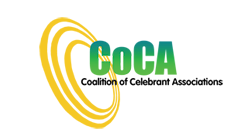Post draft 1 public consultation with the AGD department
Tuesday 16th April 2013 in Canberra, Robyn McEwan CSHISC Skills Council Project Officer met with 6 CoCA associations and the following staff from the Marriage Law & Celebrant Section Attorney-General's Department - Susan Davies Marriage Registrar; Ruvani Panagoda Senior Legal Officer; Esther Bogaardt Senior Legal Officer; Angela Tsongas Administrative Officer.
The MLCS queried why the recommended upgrade when the course had only been required as an appointment qualification since 2010. (Note this was a result of the Second Review of Celebrancy Training in 2007).
Robyn McEwan CSHISC explained that previous Skills Council work had not started with a Job Description. This was what was significantly different to the previous review. Also this knowledge and skills set was then compared with the Australian Quality Framework and the fact that marriage celebrants are the professionals authorised under the Act with the full responsibility of conducting the marriage.
The MLCS was extremely concerned about the compacting of 4 Marriage Units into One Marriage unit and One unit on Sustainable Professional Practice under the Streamlining process. The MLCS did not support the inclusion of the unit pn Professional Practice.
CoCA representatives suggesting increasing the number of Marriage Specific Units to 3 by retaining the two Marriage Units "Develop an effective relationship with a marrying couple" and "Conduct and review a marriage ceremony in line with legal requirements", and moving the Professional Practice unit into the Core subject area.
The MLCS agreed to consider this proposal.
On Thursday 18th April, at a formall meeting of the peak body CoCA and the AGD, CoCA explained to the MLCS its participation in the Community Services and Health Industry Skills Council Review of the Certificate IV in Celebrancy and the interest in increasing the Certificate IV level qualification to a diploma level qualification based on the job role of a celebrant, and the changing context within which celebrants had to work, now that the cap on numbers had been lifted. CoCA explained that at its meeting on Wednesday the 17th April, the CoCA deleagtes of all CoCA associations had reviewed the Job Description, the Australian Qualifications Framework and by formal motion had indicated CoCA's unanimous support for the Diploma level qualification.
Peter Araundo AGD explained that the Marriage Regulations 1963 currently list the Certificate IV in Celebrancy as the minimum training requirement for aspiring celebrants. It will need strong evidence to justify any increase in the qualification to a Diploma level qualification. This is because AGD must justify regulatory change to the Office of Best Practice Regulation and it needs to demonstrate that there is a problem that needs to be fixed through that regulatory change. CoCA explained that in its view, only it and the CSHISC can determine the level of training, not AGD because as the regulator AGD’s role would only relate to marriage celebrancy. Peter Araundo AGD disagreed with this view.
There was discussion about tightening the assessment requirements in the training package for the Certificate IV. AGD is providing input into the CSHISC review and has provided CoCA with a summary of its submission to CSHISC.
Based upon the feedback of the above meetings the CoCA / IRG representative and the Skills Council Project Officer drafted the following suggested plan for revising the Diploma based upon the AGD feedback.


